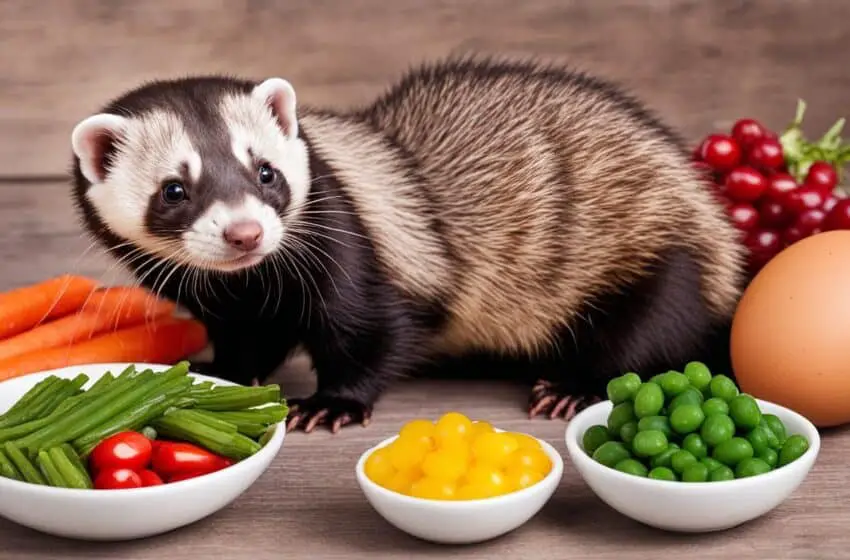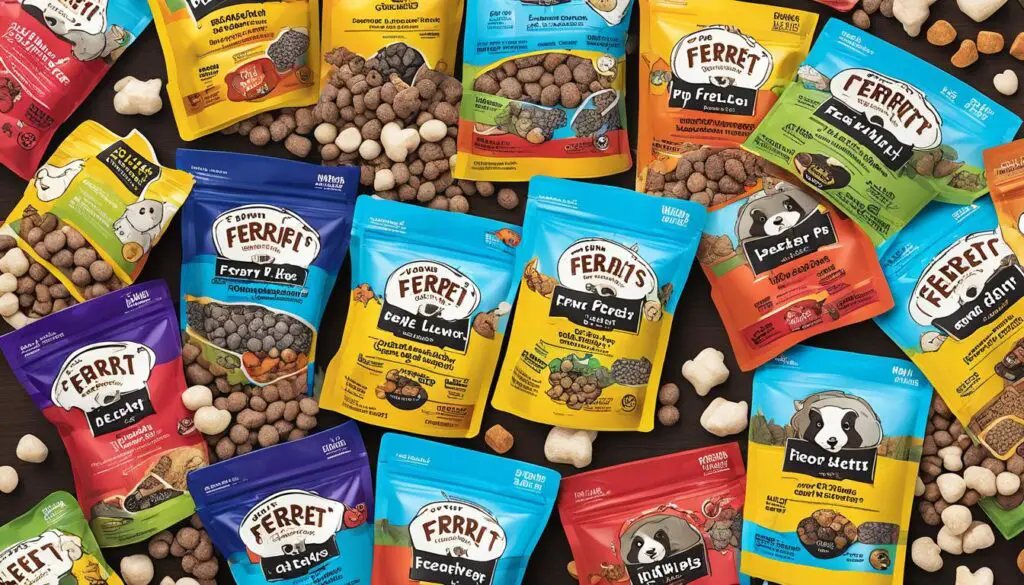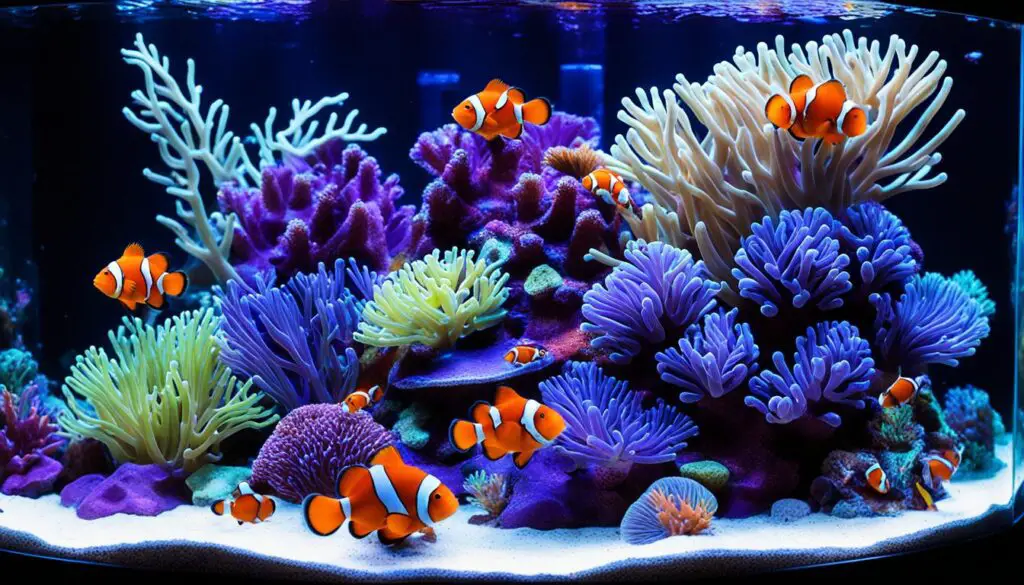Selecting the Best Nutritious Foods for Your Ferret

Ferrets have unique dietary needs that require careful consideration when selecting their food. It is crucial to provide them with a balanced diet that meets their nutritional requirements. This section will provide expert tips and recommendations for selecting the best nutritious foods for your ferret, ensuring their health and well-being. The information is compiled from various sources.
Key Takeaways:
- Consider your ferret’s unique dietary needs when selecting their food.
- Provide a balanced diet that meets their nutritional requirements.
- Choose high-quality commercial ferret foods that contain animal-based proteins.
- Supplement their meals with small amounts of fresh ferret-safe fruits and vegetables.
- Establish a consistent feeding schedule and control portion sizes.
Understanding Ferret Dietary Needs
Ferrets are obligate carnivores, which means their diet should primarily consist of meat. They have specific nutritional requirements that contribute to their optimal health and longevity. It is crucial to understand these dietary needs to ensure your ferret receives the necessary nutrients for a balanced diet.
When it comes to ferret dietary needs, high-quality animal-based protein is essential. Ferrets require protein-rich foods to support their active metabolism and muscle development. They also need a moderate amount of fat in their diet for energy. However, it is important to note that ferrets have a unique digestive system, and excessive fat intake can lead to health issues such as obesity.
In addition to animal-based protein and moderate fat, ferrets require essential fatty acids, such as omega-3 and omega-6, for healthy skin and coat. These fatty acids can be obtained from sources like fish oil or specific ferret supplements.
Carbohydrates should make up only a small portion of a ferret’s diet, as their bodies have limited ability to digest carbohydrates. Ferrets lack the necessary enzymes to break down complex carbohydrates efficiently. Therefore, it is crucial to limit the amount of carbohydrates they consume to prevent digestive issues.
To summarize, the essential nutrients for ferrets include:
- High-quality animal-based protein
- Moderate amount of fat
- Essential fatty acids
- Limited carbohydrates
Understanding these dietary needs is crucial for selecting the right foods and ensuring your ferret’s overall well-being. In the next section, we will explore the different options available for commercial ferret foods and how to choose the most appropriate diet for your furry friend.
Choosing Commercial Ferret Foods
When it comes to providing the best nutrition for your ferret, commercial ferret foods are a convenient and reliable option. These specially formulated diets are designed to meet the unique nutritional needs of ferrets, ensuring they receive the essential nutrients they require for optimal health.
When choosing a commercial ferret food, it’s important to carefully examine the ingredient list. Look for products that prioritize high-quality animal proteins as the primary ingredient, such as chicken or turkey. These proteins are crucial for supporting your ferret’s carnivorous nature and providing the necessary amino acids for growth and overall well-being.
Avoid commercial ferret foods that contain excessive fillers, grains, or artificial additives. Fillers and grains are unnecessary for a ferret’s diet and can contribute to digestive issues and weight gain. Artificial additives, such as colors and flavors, offer no nutritional benefit and may harm your ferret’s health in the long run.
Reading and understanding the ingredient list may seem daunting at first, but it is an essential step in ensuring the quality of the commercial ferret food you choose. Look for names of specific meats or meat meals, rather than vague terms like “meat by-products,” to ensure your ferret is getting the highest quality protein sources.
“Choosing a commercial ferret food with high-quality animal proteins as the primary ingredient provides a balanced and nutritious foundation for your ferret’s diet.”
If you’re unsure which commercial ferret food to choose, consult with your veterinarian for personalized recommendations based on your ferret’s specific needs and health conditions. They can provide valuable insights and guidance to help you make an informed decision.

Remember, selecting the right commercial ferret food is an essential part of providing a healthy and balanced diet for your furry friend. By prioritizing high-quality animal proteins and avoiding unnecessary fillers and additives, you can ensure that your ferret receives the nutrition they need to thrive.
Supplementing with Fresh Foods
While commercial ferret foods form the foundation of a ferret’s diet, it is beneficial to supplement their meals with fresh foods. Ferrets can enjoy small amounts of ferret-safe fruits and vegetables to enhance their nutritional intake and provide variety in their diet. Incorporating fresh foods can also stimulate their natural foraging instincts and promote overall well-being.
When choosing fresh foods for your ferret, it is important to select ones that are safe and nutritious for them. Here are some ferret-safe fruits and vegetables you can consider:
- Apples: High in fiber and a good source of vitamins A and C. Be sure to remove the seeds and cut them into small, manageable pieces.
- Carrots: Rich in beta-carotene and provide a crunchy texture for your ferret to enjoy. Cut them into thin slices or small chunks.
- Leafy Greens: Options such as spinach or kale can provide valuable vitamins and minerals. Wash them thoroughly and chop them finely before serving.
When introducing fresh foods to your ferret, start with small portions and observe their reaction. Some ferrets may have dietary sensitivities or digestive issues, so it’s essential to monitor their response. Additionally, remember that fresh foods should complement their diet, not replace it entirely. The majority of their nutrition should still come from high-quality commercial ferret foods.
Feeding your ferret fresh foods requires careful preparation to ensure their safety. Cut the fresh foods into small, manageable pieces to prevent choking or digestive issues. Always supervise your ferret during mealtime to ensure they are consuming the fresh foods properly.
Adding a variety of fresh foods to your ferret’s diet can contribute to their overall health and enjoyment of mealtimes. Experiment with different fruits and vegetables to find what your ferret enjoys most. Consulting with a veterinarian can provide additional guidance on introducing fresh foods to your ferret’s diet and ensuring their nutritional needs are met.
Expert Tips for Feeding Fresh Foods:
1. Start slowly: Introduce fresh foods to your ferret’s diet gradually, allowing their digestive system to adjust.
2. Wash thoroughly: Always wash fruits and vegetables before serving to remove any potential pesticides or contaminants.
3. Monitor portion sizes: Offer small amounts of fresh foods to prevent overfeeding and maintain a balanced diet.
4. Avoid harmful foods: Some fruits and vegetables, such as grapes, onions, and garlic, are toxic to ferrets. Research and confirm the safe options beforehand.
Benefits of Fresh Foods for Ferrets:
| Benefits | Description |
|---|---|
| Dietary Enrichment | Introducing fresh foods provides a variety of textures and flavors, enhancing their overall eating experience. |
| Nutritional Boost | Fresh foods offer additional vitamins and minerals that may be lacking in commercial ferret foods, promoting optimal nutrition. |
| Mental Stimulation | Foraging and exploring new foods can engage your ferret’s mind, preventing boredom and promoting mental well-being. |
Feeding Schedule and Portions
Establishing a consistent feeding schedule and controlling portion sizes is essential for maintaining your ferret’s weight and overall health. Ferrets are natural foragers, and feeding them two to three small meals per day mimics their instinctual eating patterns.
When determining how much to feed a ferret, it is crucial to monitor their weight and adjust portions accordingly. This prevents both obesity and malnutrition, ensuring that your furry friend maintains an optimal body condition.
Consulting with a veterinarian is highly recommended to determine the appropriate feeding schedule and portion sizes for your ferret. They can consider your ferret’s specific needs, such as age, activity level, and overall health, to provide personalized recommendations.
Remember, each ferret is unique, and their dietary requirements may vary. It’s important to follow your veterinarian’s guidance and monitor your ferret’s weight regularly to ensure they remain healthy and happy.
Water and Hydration
Hydration is crucial for a ferret’s well-being. Just like humans, ferrets need access to clean, fresh water to maintain their health. Keeping your furry friend hydrated is essential for their overall well-being.
One of the best ways to provide water to your ferret is through a ferret water bottle. This method ensures a constant and accessible water supply, while also reducing the risk of drowning and maintaining cleanliness.

When setting up a water bottle for your ferret, make sure it is securely attached to the cage and easily drinkable for your pet. Regularly check the bottle to ensure it is functioning properly and not leaking.
Ferrets have a high metabolism and can become dehydrated quickly. It is important to monitor their water intake and refill the bottle as needed to ensure they always have access to fresh water. Additionally, remember to clean and sanitize the water bottle regularly to prevent bacteria growth.
Key Tips for keeping ferrets hydrated:
- Provide a ferret water bottle to ensure a constant supply of fresh water.
- Securely attach the water bottle to the cage for easy access.
- Monitor water levels and refill as needed to prevent dehydration.
- Clean and sanitize the water bottle regularly to maintain cleanliness.
Benefits of keeping ferrets hydrated:
Proper hydration helps maintain healthy bodily functions in ferrets. It aids digestion, regulates body temperature, promotes healthy skin and coat, and supports overall well-being. By providing clean, fresh water through a ferret water bottle, you can ensure your furry friends stay happy and hydrated.
| Benefits of Keeping Ferrets Hydrated | How to Keep Ferrets Hydrated |
|---|---|
| • Supports proper digestion | • Provide a water bottle for easy access to water |
| • Regulates body temperature | • Securely attach the water bottle to the cage |
| • Promotes healthy skin and coat | • Monitor water levels and refill as needed |
| • Supports overall well-being | • Clean and sanitize the water bottle regularly |
Conclusion
In conclusion, proper nutrition plays a crucial role in maintaining the health and well-being of your ferret. By understanding their unique dietary needs and following a few key guidelines, you can provide them with an optimal diet that supports their overall health.
Start by selecting high-quality commercial ferret foods that contain essential animal-based proteins and minimal fillers. These foods are specifically formulated to meet the nutritional requirements of ferrets and provide the necessary nutrients for their growth and vitality.
Additionally, supplementing their meals with fresh foods, such as ferret-safe fruits and vegetables, can offer variety and additional nutritional benefits. Remember to be cautious with portion sizes to avoid overfeeding or underfeeding. Consult with a veterinarian to determine the appropriate feeding schedule and portion sizes for your specific ferret.
Caring for your ferret’s health goes beyond just their diet. Ensure they have access to clean, fresh water at all times, ideally provided through a secure water bottle. Regular veterinary check-ups are also essential to monitor their overall well-being and receive expert guidance on maintaining their optimal nutritional status.
FAQ
What are the dietary needs of ferrets?
Ferrets are obligate carnivores and require a diet primarily consisting of meat. They need high-quality animal-based protein, essential fatty acids, and limited carbohydrates.
What should I look for in commercial ferret foods?
When selecting commercial ferret foods, it’s important to choose products that contain high-quality animal proteins as the primary ingredient, such as chicken or turkey. Avoid foods with excessive fillers, grains, or artificial additives.
Can I give my ferret fresh foods?
Yes, you can supplement your ferret’s meals with small amounts of ferret-safe fruits and vegetables, such as apples, carrots, and leafy greens. Just make sure to cut them into small pieces to prevent choking and digestive issues.
How often should I feed my ferret?
Ferrets should be fed two to three small meals per day, as they are natural foragers. Establish a consistent feeding schedule and adjust portion sizes based on your ferret’s weight to prevent obesity or malnutrition.
How should I provide water for my ferret?
It’s crucial to provide your ferret with constant access to clean, fresh water. Using a water bottle is recommended to maintain cleanliness and prevent drowning. Ensure the water bottle is securely attached to the cage and easily drinkable for your ferret.
What should I consider when selecting nutritious foods for my ferret?
When selecting nutritious foods for your ferret, consider their unique dietary needs, choose high-quality commercial ferret foods, supplement with fresh foods, and monitor portion sizes. Consult with a veterinarian for personalized recommendations and advice.



